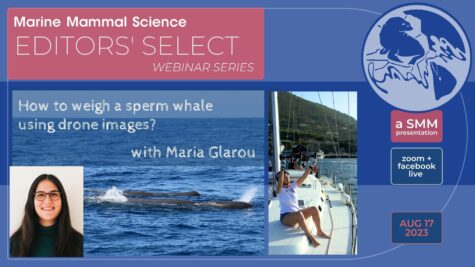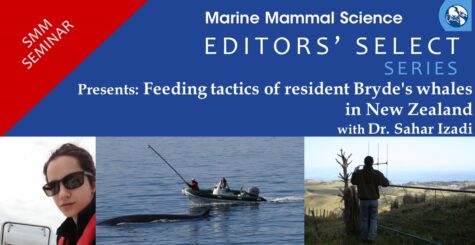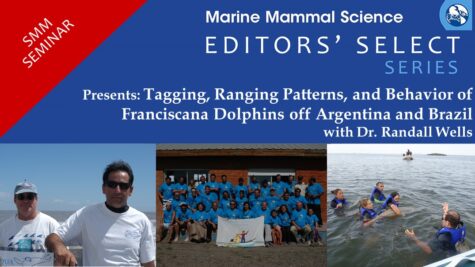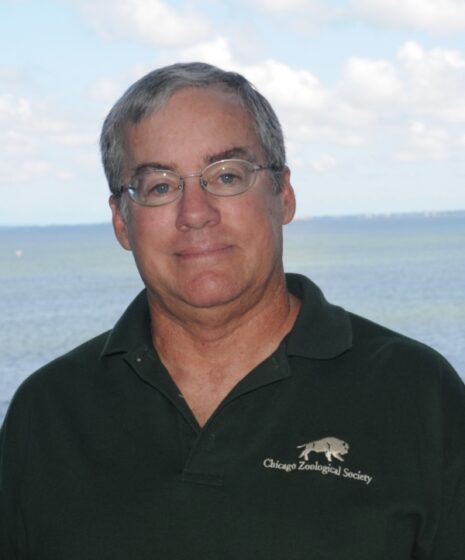The Society for Marine Mammalogy (SMM) announces six conservation awards totaling $140K!
Over the past several years the SMM has raised money for a newly created Conservation Fund. The purpose of this endowment fund is to support research and education projects worldwide that can help catalyze real conservation action to save the world’s most endangered marine mammals.
Conservation proposals were solicited from the SMM Members in July 2021 for the first round of awards. Each of the 41 submitted proposals were judged by at least three members of the SMM Conservation Committee or Committee of Scientific Advisors. Scores were tallied and normalized to adjust for individual differences among judges. Initially, we expected to fund only two proposals (for a maximum of $25,000 each) from the Conservation Fund endowment. However, that would have left many outstanding proposals unfunded. Last-minute fund-raising provide an additional $90,000, allowing us to fund the top six proposals. The funded proposals include two in South America, one in Africa, and three in southern Asia. Research will occur in 12 countries, including Bolivia, Brazil, Cambodia, Cameroon, Colombia, Congo, Gabon, Gambia, Liberia, Myanmar, Pakistan, and Senegal. A brief summary of each project is given below.
“This is the culmination of years of effort, and it is rewarding to see such a fine collection of projects for our inaugural year” says SMM Conservation Fund coordinator, Jay Barlow. He adds, “However, the quality of the remaining unfunded projects shows how great the need is and how many people are willing to help save the world’s marine mammal species. We need to raise more funds so that we can do more.”
Project Summaries:
Title: Harnessing local ecological knowledge to fill data gaps and support conservation of the Critically Endangered Atlantic humpback dolphin (Congo, Gabon, Cameroon, Liberia, Senegal & Gambia).
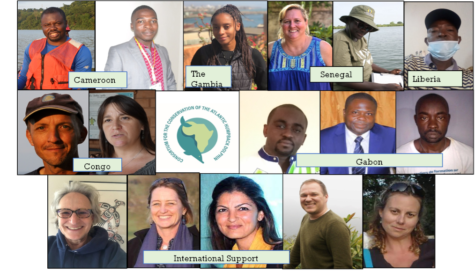
PIs: Aristide Kamla Takoukan (& team)
Summary: This project will use interview-based survey campaigns in Congo, Gabon, Cameroon, Liberia, The Gambia and Senegal to gain local ecological knowledge about the distribution, conservation status, and threats to Critically Endangered Atlantic humpback dolphins.
Find out more at:
African Marine Mammal Conservation Organization (AMMCO): https://www.ammco.org/ and https://www.facebook.com/ammco.org/ and https://twitter.com/AMMCO_SIREN
Consortium for the Conservation of the Atlantic Humpback Dolphin (CCAHD): https://www.sousateuszii.org/ and https://www.facebook.com/sousateuszii and https://twitter.com/sousateuszii
Title: How many Amazon river dolphin species are there? “Capturing” genomic and morphological evidence to clarify the Inia’s taxonomy to help their conservation (Colombia, Brazil & Bolivia).
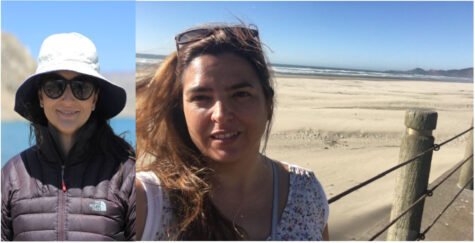
PIs: Susana Caballero Gaitan & Larissa Oliveira
Summary: Obtain morphological and genomic (“museomics”) information, using mostly specimens from Museums around the world to understand and clarity the controversial taxonomy of the Inia genus.
Title: Developing a necropsy program to determine the efficacy of reducing Mekong River dolphin mortality with a River Guard enforcement and outreach program (Cambodia)
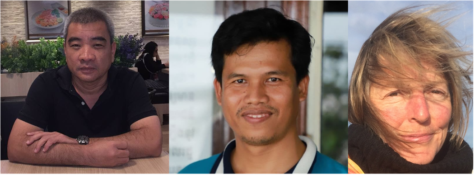
PIs: Somay Phay, Eam Sam Un, Francis Gulland.
Summary: This project aims to determine the causes of Mekong River dolphin mortality, and to assess the efficacy of an established River Guard program to reduce deaths of these animals.
Find out more: http://www.wwf.org.kh
Title: An integrated approach to the conservation of coastal cetaceans in the Gulf of Mottama, Myanmar

PIs: Wint Hte, Yin Yin Htay, and Tara Whitty.
Summary: The project will establish an acoustic monitoring program for N. phocaenoides, estimate bycatch rates in small-scale fisheries through Rapid Bycatch Assessments, refine understanding of the current and past distribution of these species in the Gulf of Mottama through Local Ecological Knowledge surveys, and train community youths in research and community engagement skills.
Find out more: https://www.facebook.com/MyanmarCoastalConservationLab/
Title: Veterinary capacity building to fill vital knowledge gaps for the endangered Indus River dolphins (Platanista minor) rescued from irrigation canals (Pakistan).

PIs: Forrest Gomez, Cynthia Smith, Massod Arshad, Gill Braulik, and Uzma Khan.
Summary: The entrapment of Indus River dolphins in irrigation canals in Pakistan is an imminent threat to this endangered species. While rescue operations occur, there is a critical need for veterinary monitoring and assessment to provide the animals a better chance of survival. There is also an urgent need to collect scientific data to help protect and conserve the species. The SMM Conservation Fund will allow our international, collaborative team to build local capacity by training Pakistani veterinary first responders. We will also collect essential scientific and health data to fill critical species-specific knowledge gaps. Thank you to the SMM for supporting this important work.
Find out more:
https://www.wwfpak.org/our_work_/wildlife_2/indus_dolphin/
https://www.nmmf.org/marine-mammal/south-asian-river-dolphin/
Instagram: @nmmfoundation, @wwfpak, @cynthia_smith_dvm, @forrestgomez
Facebook: @nmmf.org, @WWFPak, @forrest.emorygomez
Title: Counting to protect: population estimation of a highly threatened subpopulation of river dolphin (genus Inia) in the Tocantins, the most impacted river by dams and land use changes in Brazil
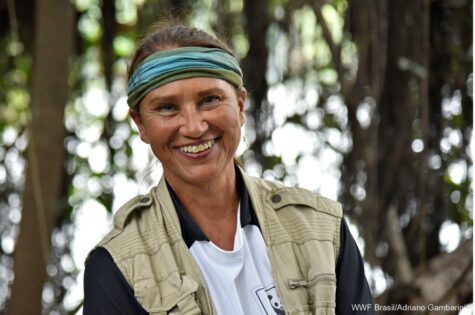
PI: Miriam Marmontel
Summary: Conduct survey to estimate the abundance of Araguaian boto along the Tocantins River, where segmentation by seven hydroelectric dams and rapid changes in land use is heavily impacting this dolphin population.

